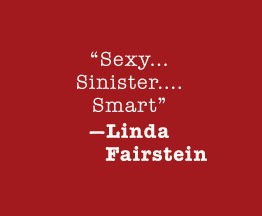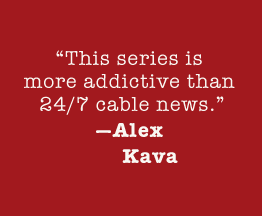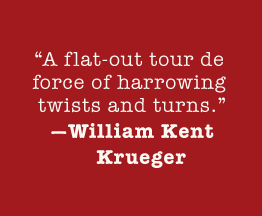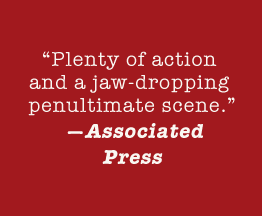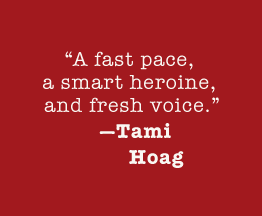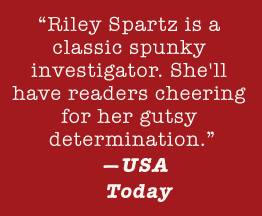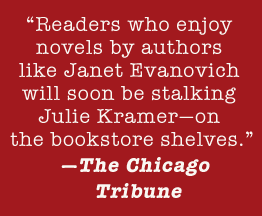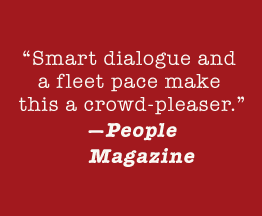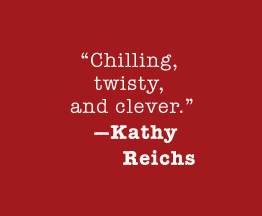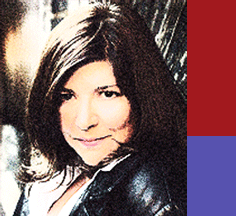
Q & A
On Writing
You're a career television news producer. How has your background in journalism helped you become a novelist?First, I've interviewed hundreds of people, many on the best or worst days of their lives. I believe listening carefully for the most intriguing parts of those conversations helped me develop an ear for dialogue. Also, I used to produce and write a television newscast. Both anchors had different personalities, cadence, and vocabularies. When I switched stories between them, I found I wrote differently to reflect those distinctions. I think that skill taught me nuances in crafting dialogue.
Second, deadlines didn't scare me.
Third, research was second nature.
Fourth, I learned to type fast and write tightly.
Fifth, and perhaps most importantly, I've covered such a variety of events and people, that no plot or character from my imagination seems over the top. I absolutely believe the adage, truth is stranger than fiction. Because I've lived it in my day job. Other writers sometimes hold back, thinking, "No one will ever believe that." My advice to them is, because of what people see on the news each day, you can go further than you think. For example, what if I were writing a novel about a woman driving cross-country to kill a rival for her boyfriend's affection and she wore a diaper to avoid bathroom stops? And what if I made her an astronaut? See what I mean.
Why did you decide to write fiction?
All journalists think they have novels inside them. Eventually we have to put up or shut up. Whenever I was writing news stories, I often thought, darn the facts. Work would be so much easier if I wasn't bound by facts. But when I started writing fiction, it was hard. Making stuff up seemed like cheating. I found myself wishing I had some facts. I had to work through that dilemma. So many people now tell me, "What a fun job, writing books!" All I can say is, writing a novel is a painful process. It hurts.
Do you base characters on real people in your life? How do you come up with names?
People always ask that, and I tell them they're a combination of everyone I've ever worked with, for, or against in the world of news. Naming characters is hard for me. I chose Spartz to honor my mom because that's her maiden name. But, in most cases, I open the phone book and point. My friends and relatives now all want their names to appear in future books. But that is problematic. They all want to be the hero. They all want to be beautiful. No one wants to be the villain. No one wants to be fat or ugly or stupid. So, I'm sticking with the phone book.
How much do you know about your endings when you start your beginnings?
In both cases, with STALKING SUSAN and MISSING MARK, when I first started writing, I had no idea who the killer was. That came to me in the course of telling the story. I thought if I was surprised, maybe readers would be, too. I realize there will always be a few sharp minds who figure out the "Who Done It" ahead of time. That always happens. And congratulations to them; but, I hope they are equally intrigued by the "Why Done It" in the stories. As a reader myself, I often find that motivation even more interesting.
Talk about your use of subplots and re-occurring characters.
I wrote a sequel because I felt I wasn't quite done with the characters in STALKING SUSAN. I was eager to see what would happen next in Riley's life and whether there might be room for Nick Garnett. And as newsrooms across America are struggling in a media meltdown, I also wanted to reflect that change in the story line. In real life, I'm more of a cat person than a dog person but I became fond of Shep and wanted him to be a hero in his own subplot. Real K-9 units do worry about their star dogs becoming targets in the drug war. But, I hadn't seen that premise used in a novel before and thought that would be an interesting role for him.
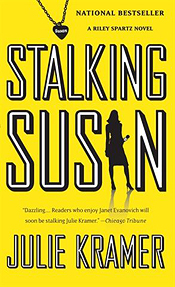
Q & A
ON STALKING SUSAN
CAUTION: SPOILERS AHEADSTALKING SUSAN deals with a serial killer targeting women named Susan, killing one on the same day each year. Do you have a special enemy named Susan?
No. STALKING SUSAN is not a tale of personal revenge. And I apologize to any Susans out there. I was inspired by two cold cases I covered as a WCCO-TV journalist a decade ago. They involved two women in St. Paul, MN both named Susan, strangled on the same day, two years apart. I hoped doing a story might shake loose some new tips and lead to a break in these unsolved murders. It didn't. The first homicide is now 25 years old and the killer is still out there. When I sat down to write a novel I first created my character, Riley Spartz, but then needed an adventure for her. It's the unresolved cases that stay with journalists years later. Somehow the Susan story came to mind; you see, I never forgot them. I changed the city, the time of year, the women's last names... and I almost changed their first name, but I wanted to keep something of them in the story. As you know from reading it, name origination becomes part of the plot, so if I'd called them Mary, it would have been an entirely different story.
How would you describe STALKING SUSAN to someone you met on the street?
It's a cross between The Da Vince Code and Oh Susannah. Seriously, I hate simplifying things like that. I think STALKING SUSAN takes readers inside the desperate world of TV news in a classic serial killer thriller that involves the Bible, the calender, and a smart heroine pitted against a smart antihero. I don't like stories in which the protagonist stumbles across the solution. I like them to work for it. What I think makes this story so memorable is the subplot of how grief changes people. Riley is a victim of grief, but so is our villain. In some ways, grief is an equalizer in life. How we deal with it says a lot about who we are.
Did you know who the killer was when you started writing your book?
No. I sort of made it up as I went along. I was just as anxious to see what would happen next. For a while I wanted to come up with a believable scenario in which Nick Garnett was the killer. I thought that would be real cool. But I also believed for justice to prevail, the killer needed to die. And I grew too fond of him to kill him off. I also wanted to keep him around in case there was a sequel. He seemed like a character with a lot of potential.
You weave some real life news stories in your novel, like the collapse of the Minneapolis bridge. Why did you do that?
After the book was sold and in production, the bridge fell. I was there, working through the night, covering the story for the Today Show and in fact, was the only journalist to get a live interview the next morning with one of the rescued kids from the school bus that fell in the river. Since my novel was set in Minneapolis, I felt I had to include some references to snarled traffic and detours in order to be realistic. My publisher allowed me to make these changes. I also refer to other bona fide news stories in my novels because I think it's fun and I think it makes the made up stuff seem more realistic. Here's some evidence: several readers have told me they don't remember the big explosion on the Iron Range that killed so many people, and why didn't it get more news coverage? I've had to remind them that even though STALKING SUSAN is written in first person, it's a novel, not a memoir. Most of what's between the pages is all ficiton. But I take it as a compliment that that readers buy into the world I've created.
Are television newsrooms really so obsessed with ratings?
Yes.
Sometimes people ask if I exaggerate the flaws of the profession for dramatic effect. I suppose that's possible. But really no more than John Grisholm does with the legal world. Critics say one of the strengths of STALKING SUSAN is that it really does show how decisions are made in television newsrooms. Some of my news colleagues think I gave away a little too much in the way of newsroom secrets. Did you really have to tell them "If it bleeds, it leads?" But I felt for the book to work, I needed to come clean about some of the flaws in my profession.
Do you dislike your day job?
No. I love it. There is nothing like the exhilaration, unpredictability, and desperation of live TV. I want readers to feel the wild competitiveness and satisfaction that comes from nailing a big story against the odds.
STALKING SUSAN is a finalist for several awards, including the Mary Higgins Clark Award, which honors books featuring women whose lives are invaded and who must use their own courage and intelligence to get out. Another criteria is that the story contain no explicit sex, violence, or strong language. Was that a conscious decision on your part?
Not really. I didn't start out with that on my mind. I've read books in which sex and violence advanced the plot. But I've also read books in which sex and violence seemed to get in the way of the story. As if someone told the author, sex sells, better put some in. Some people suggested I add a sex scene to jazz things up. Certainly my charcters have sex. And some die violently. But that action happens off screen. I'm not saying I wouldn't ever write a sex scene, but as the story unfolded, that's just how it played out. Perhaps I was influenced by the fact I have teenage sons, and want them and their friends, to be able to read my book without being embarrassed. I don't think readers are missing out on anything by me not naming specific body parts. There are places in my story where people cry. There are places where people cheer. Those were conscious decisions on my part. Because I feel a book needs to move readers emotionally for them to connect with the characters.
What was your writing process like for STALKING SUSAN?
Solitary. Very few people knew I was writing a book until it sold. My kids knew because I kept kicking them off the computer. I kept quiet about it because I have a large extended family (seven siblings) and I didn't want them constantly asking me what page I was on, or whatever happened to that book you said you were going to write. Now they all want to be in my next book, and that creates its own problems. Everyone wants to be the hero. Nobody wants to be the villain. And they all want to be cute, with toned bodies and interesting jobs. No one wants to be flawed, get fired, or be killed. So I tune them out.
STALKING SUSAN was your first book. Any advice to other aspiring writers?
Yes. Never give all the characters the same name. That was a major pain.
What other challenges did you face in sitting down to write?
The year before I started writing, I concentrated on reading. I knew I wanted to write a series, so I read all my favorite author's debut books that resulted in successful series. Kathy Reichs, Linda Fairstein, Sue Grafton. John Sandford. Patricia Cornwell. I tried to read as both a critic and a fan and focus on why readers embraced their characters.
I'm In reading books, I tired of fictional TV reporters always being portrayed as annoying secondary character who could be killed off when the plot started dragging. So I wanted to make one in which the TV reporter was the hero. A close friend, who I really respect, said a reader has to fall in love with a story's protagonist and she worried that people hate TV reporters so much, it's not possible to make one likeable. So I always had that worry in the back of my mind as I wrote. I knew I was going against sterotypes. That's why I'm so pleased when reviewers say, this is a series we want to see more of, and readers tell me how much they enjoyed getting to know my heroine, Riley Spartz, and want to know what's next.
What is ahead for Riley?
In the sequel, MISSING MARK (July 14, 2009), Riley answers a want ad reading, "Wedding Dress For Sale: Never Worn," and is drawn into a dangerous missing person case during sweeps month. All my life, I've been curious about such ads. A wedding dress is the most emotional item in a woman's closet. What would make her part with it—anger, grief, economics? I've often been tempted to call them and ask "What happened?" Here I was able to use my imagination. Oh and yes, Shep makes a another appearance in a subplot about a meth cartel out to assassinate a K-9 dog for his powerful nose for drugs.
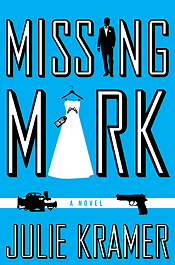
Q & A
ON MISSING MARK
CAUTION: SPOILERS AHEADIn MISSING MARK, how did you decide to focus on missing people as an adventure for protagonist Riley Spartz?
In my debut, STALKING SUSAN, a TV reporter discovers a serial killer targeting women named Susan. I didn't want to write back to back serial killers (even though I've been told they sell well) because journalists cover a variety of stories, and I wanted to reflect that in this series. In real life, I've covered numerous missing people, including some of the most high profile cases in the country: Jodi Huisentruit (Iowa), Jacob Wetterling (Minnesota), Audrey Seiler (Wisconsin), and Shawn Hornbeck (Missouri). I wanted to give readers a provocative look at how newsrooms decide which missing people get publicity and which don't. It can be controversial. When I started out writing MISSING MARK, my missing person character was a woman. But, when a young man in my neighborhood went missing while home for the holidays, I changed my missing person to a man because I wanted to draw attention to how difficult those cases can be for families and law enforcement, as well as news organizations.
"Wedding Dress For Sale: Never Worn"... how poignant is that?
A woman's wedding dress is the most emotional piece of clothing in her wardrobe. I've always been fascinated by the back story of why a woman would part with it. Hard economic times? Memories of a relationship gone bad? A nagging feeling in her gut that she should break the engagement? I thought readers might be curious as well.
Where did you get your inspiration for face blindness in the plot?
While working as a freelance producer for the Today Show, I interviewed a woman afflicted by prosopagnosia for one of the first national news stories on the developmental disorder. I continued to be intrigued by face blindness. At first, my editor was skeptical about using the concept in a novel because it was so new. But the journalist in me thought, "Great, I'll be first." The obvious plot device would have been to create a face blind victim unable to recognize her attacker. I thought it might be more unexpected to use the disorder for a villain's motivation. I found myself pondering how important facial recognition is to social success and the controversy over face transplants. I also like teaching readers about something new, whether it's prosopagnosia or how newsrooms function behind the scenes. If readers can learn while being entertained, I think they appreciate that combination.
Until the case of the missing groom turned into a murder investigation, reporter Riley and bride Madeline seemed to be on the path to friendship. What made them chummy?
On different levels, they're both lonely. Riley has a successful career that's brought her professional kudos, but not many personal connections. In STALKING SUSAN, she suffers a tragic loss that makes friendship even more difficult. Madeline has money, but also lacks friends. She too has suffered a loss of love. The grief theme allows them to be candid with each other in a way they can't with others. When journalists conduct investigations, they often become close to the family whose story they're trying to tell. The family often becomes even more attached to the reporter because someone is finally listening to their pain. Journalists need to guard against losing objectivity in such cases. The relationship, at least until the story is concluded, needs to remain professional. But we are all human, and as journalists our creed is to comfort the afflicted and afflict the comfortable.

